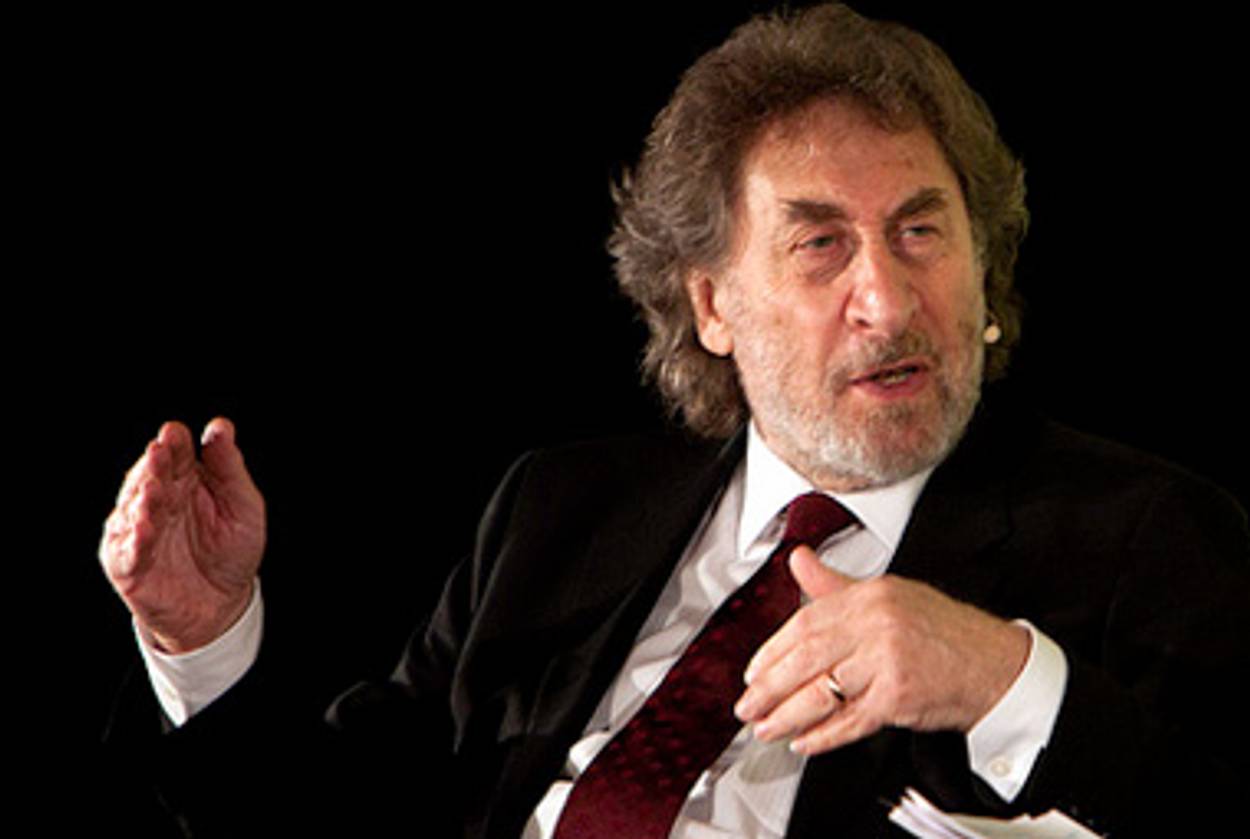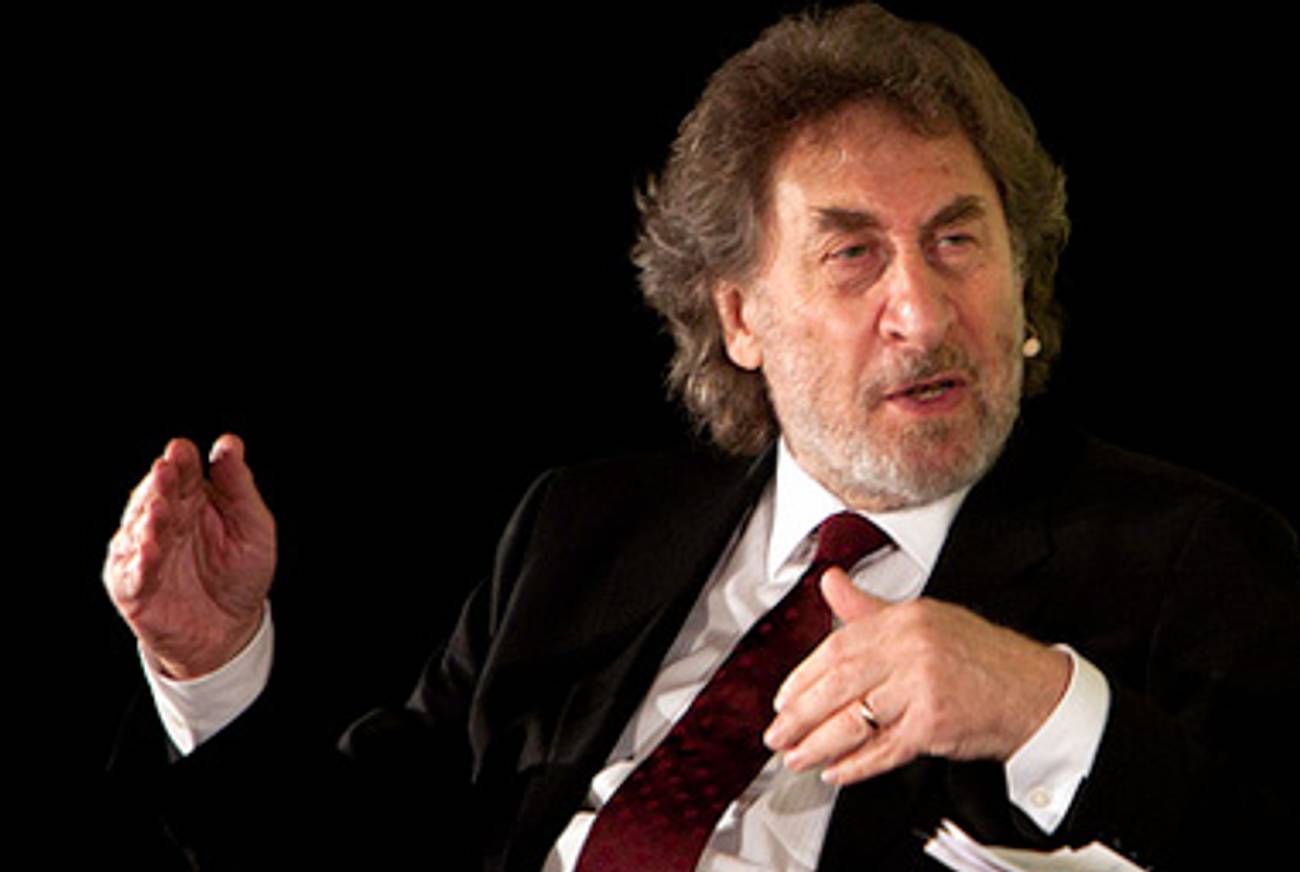Paddle Tale
In The Mighty Walzer, Howard Jacobson serves up not just the greatest ping-pong novel ever written but a rollicking portrait of mid-century Jewish Manchester




Howard Jacobson has long been recognized in Britain as a great comic novelist, but it wasn’t until he won last year’s Man Booker Prize for The Finkler Question that word really started to spread on this side of the Atlantic. That novel, like so much of Jacobson’s work, made relentless, unsettling comedy out of the collision of Jewishness and Englishness. But as Jacobson engaged with the fraught political situation of English Jews today—the growing anti-Zionism, the prominence of what he bitterly named “ASHamed Jews,” the rise of Muslim immigrant violence—Finkler’s comedy took on a distressing edge. Even the plot of Finkler, which features a Gentile obsessed with Jews and Jewishness, harks back to American Jewish novels of the 1940s like Arthur Miller’s Focus and Saul Bellow’s The Victim, with their nervous testing of the limits of tolerance.
The American release of The Mighty Walzer(Bloomsbury, $16), Jacobson’s acclaimed 1999 novel, gives us the chance to see him in a different mode—less troubled, more nostalgic, more energetically hilarious. Writing quasi-autobiographically about his childhood in 1950s Manchester, Jacobson evokes the insularity of the Jewish community, made up of fairly recent immigrants from Eastern Europe, and their wary fascination with the “real” English. This Jewish world is doubly provincial: a generation removed from “some sucking bog outside Proskurov,” still able to feel “mud from the Bug and the Dniester” clinging to them, Manchester’s Jews regard “Shaygetsshire” with wary fascination.
At the same time, Jacobson notes, the England they are assimilating to is itself provincial, a lower-middle-class Manchester with a fatal taste for “swag”—that is, junk, kitsch, crap. The Walzers, in fact, make their living from swag; the father of the family is a peddler of knickknacks, “ornamental Dutch pee-pee boys with Chinese faces, and flowery wall plates that said ‘Too Grand Ma,’ and brass mirrors in the design of a ship’s porthole.” Oliver Walzer, Jacobson’s grubby adolescent hero, looks on with horror: “Under the influence of swag, we became confused. Aesthetically confused. Whether we also became morally confused is the big question. I believe it depressed us—I’ll go that far. I believe the ugliness of the tsatskes we sold, and then surrounded ourselves with, demoralized us.”
But then, Oliver is in no position to sneer. Egotistical, sex-obsessed, pathologically shy, he is the gauchest, grossest Walzer of them all. It seems hard on Jacobson that just about every American reviewer of his books compares him to Philip Roth—indeed, the cover of The Mighty Walzer features a quote from Janet Maslin that mentions Roth’s name three times in the space of one sentence. But it’s impossible to miss the family resemblance between Oliver Walzer and Alexander Portnoy, Roth’s horny, neurotic avatar. It may have been a desire to go Roth one better that led Jacobson to make Walzer an even more defiantly perverse masturbator than Portnoy, who famously employed a piece of liver. When Oliver locks himself in the bathroom, however, it’s to cut the heads out of photographs of his female relatives and paste them onto bodies from pornographic magazines. “And I did this even to my little Polish grandmother? Especially to my little Polish grandmother.”
This is skin-crawling, but as in Roth and Mordecai Richler—who is the Canadian member of this international brotherhood of literary tummlers—it is also psychologically revelatory. Personally, I have always found it hard to sympathize with the sexual hang-ups of that generation of Jewish male writers—especially their inability to have erotic feelings about Jewish women, their fixation on blond goddesses. But the phenomenon is so well-established that there must some sociological reason for it. Maybe the answer can be found in Isaac Rosenfeld’s 1949 essay “Adam and Eve on Delancey Street,” which equates kashrut with the incest taboo. If sexual desire is trayf, Rosenfeld writes, then it has to be kept outside the Jewish family, restricted to Gentiles. Walzer feels just the same way. As Jacobson writes in one of his mad riffs: “I’d been brought up, by precept and example, to believe that virginity was an exclusively Jewish property. Why would a hymen have been called a hymen if it wasn’t Jewish? I had cousins called Hymen. We all did. Becky and Shoshanna Hymen.”
If this doesn’t make you laugh, you won’t like Jacobson; if it does, you’ll feast on The Mighty Walzer. Here, as often, it’s in words themselves that the comedy of Jewishness erupts. The novel is packed with Yiddish words, which are never translated, helping to underscore the sense that Walzer and his friends literally speak a different language from their Gentile peers. The difference between unserer and anderer, us and them, is always on their minds. Even when they’re speaking English, Jacobson writes, they can’t shake “the belief that we could magic words and that none of them would hear what we were saying.”
There is just one place where Jacobson’s timid hero becomes strong, skilled, and competent, where he can be “the Mighty Walzer.” The joke is that this place is the ping-pong table: Oliver is a hero of an unheroic game, a champion of a sport no one cares about. Jacobson writes about ping-pong knowledgeably, lovingly, with Nabokovian lyricism; but the fact remains that he is writing about ping-pong, and he delights in the mock-heroic irony that results. Take his poetic little treatise on the difference between old-fashioned rubber paddles and new sponge-covered ones:
My own inclination was to leave well enough alone, not because I was a purist … but becasue I liked the control conventional rubber gave me, I liked the sound—plock plock, plock plock: like the clatter of high heels on a wet pavement—I liked its associations with my old club and team-mates, and I liked the game as I played it; I liked chopping deep, arresting the ball on my forehand, telling it who was boss, and that you could only do with pimples. No one in his right mind chopped with sponge. With sponge there was no call to chop. If you needed to chop you were using the wrong rubber. And if you were using the wrong rubber you were in the wrong game.
Surely no one has ever written, or ever will write, a better ping-pong novel than The Mighty Walzer. But Jacobson’s novelistic talent really shows in the way he makes ping-pong serve as a mirror, in which Oliver’s neuroses and appetites are ludicrously reflected. He becomes romantically obsessed with a female player, Lorna Peachley, but can only get aroused by losing to her—by being humiliated, even beaten and choked. “The last thing I wanted Lorna Peachley to do was hang me from the rafters and paddle me with her bat. Not the very last thing, but one of the last things. The point of the bat was that she should use me as she used it. I didn’t want to suffer the bat, I wanted to be the bat.”
Finally, Oliver’s perverse desire to lose at ping-pong—to surrender the game whenever he meets an opponent who seems to want to win more than he does—is shown to be his fatal flaw, bound up somehow with his Jewish alienation and family misery and sexual guilt. “Winning is a test of character, as every sporting commentator will tell you, and I didn’t have any character. Grandiosity, yes. Skills, yes. But character?” Jacobson’s verdict on his alter ego is ultimately very harsh, and the novel ends with a hurried flash-forward to the present day, allowing us to see how Oliver’s adolescent flaws have ruined his adult life. Walzer’s curse, really, is that he never learned to become a comic novelist. For as Jacobson shows, it takes a writer of genius to take all of life’s sordid humiliations and redeem them with laughter.
Adam Kirsch is a poet and literary critic, whose books include The People and the Books: 18 Classics of Jewish Literature.
Adam Kirsch is a poet and literary critic, whose books include The People and the Books: 18 Classics of Jewish Literature.